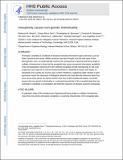| dc.contributor.author | Ricci-Tam, Chiara | |
| dc.contributor.author | Hua, Bo | |
| dc.contributor.author | Springer, Michael | |
| dc.contributor.author | Brennan, Christopher M | |
| dc.contributor.author | Moomau, Christine Anne | |
| dc.contributor.author | Hsu, Pei-Hsin | |
| dc.contributor.author | Silberman, Rebecca Estelle | |
| dc.contributor.author | Amon, Angelika B. | |
| dc.contributor.author | Thorburn, Rebecca Ruth | |
| dc.date.accessioned | 2018-06-06T18:12:34Z | |
| dc.date.available | 2018-06-06T18:12:34Z | |
| dc.date.issued | 2017-04 | |
| dc.date.submitted | 2016-12 | |
| dc.identifier.issn | 0092-8674 | |
| dc.identifier.issn | 1097-4172 | |
| dc.identifier.uri | http://hdl.handle.net/1721.1/116147 | |
| dc.description.abstract | Phenotypic variability is a hallmark of diseases involving chromosome gains and losses, such as Down syndrome and cancer. Allelic variances have been thought to be the sole cause of this heterogeneity. Here, we systematically examine the consequences of gaining and losing single or multiple chromosomes to show that the aneuploid state causes non-genetic phenotypic variability. Yeast cell populations harboring the same defined aneuploidy exhibit heterogeneity in cell-cycle progression and response to environmental perturbations. Variability increases with degree of aneuploidy and is partly due to gene copy number imbalances, suggesting that subtle changes in gene expression impact the robustness of biological networks and cause alternate behaviors when they occur across many genes. As inbred trisomic mice also exhibit variable phenotypes, we further propose that non-genetic individuality is a universal characteristic of the aneuploid state that may contribute to variability in presentation and treatment responses of diseases caused by aneuploidy. Keywords:
aneuploidy; non-genetic heterogeneity; cell-to-cell variability; gene dosage effects; biological noise; Down syndrome; cancer | en_US |
| dc.description.sponsorship | National Institutes of Health (U.S.) (Grant CA206157) | en_US |
| dc.description.sponsorship | National Institutes of Health (U.S.) (Grant GM118066) | en_US |
| dc.description.sponsorship | National Science Foundation (U.S.) (Grant DGE1122374) | en_US |
| dc.publisher | Elsevier BV | en_US |
| dc.relation.isversionof | http://dx.doi.org/10.1016/J.CELL.2017.03.021 | en_US |
| dc.rights | Creative Commons Attribution-NonCommercial-NoDerivs License | en_US |
| dc.rights.uri | http://creativecommons.org/licenses/by-nc-nd/4.0/ | en_US |
| dc.source | PMC | en_US |
| dc.title | Aneuploidy Causes Non-genetic Individuality | en_US |
| dc.type | Article | en_US |
| dc.identifier.citation | Beach, Rebecca R. et al. “Aneuploidy Causes Non-Genetic Individuality.” Cell 169, 2 (April 2017): 229–242 © 2017 Elsevier Inc | en_US |
| dc.contributor.department | Koch Institute for Integrative Cancer Research at MIT | en_US |
| dc.contributor.mitauthor | Beach, Rebecca Ruth | |
| dc.contributor.mitauthor | Brennan, Christopher M | |
| dc.contributor.mitauthor | Moomau, Christine Anne | |
| dc.contributor.mitauthor | Hsu, Pei-Hsin | |
| dc.contributor.mitauthor | Silberman, Rebecca Estelle | |
| dc.contributor.mitauthor | Amon, Angelika B. | |
| dc.relation.journal | Cell | en_US |
| dc.eprint.version | Author's final manuscript | en_US |
| dc.type.uri | http://purl.org/eprint/type/JournalArticle | en_US |
| eprint.status | http://purl.org/eprint/status/PeerReviewed | en_US |
| dc.date.updated | 2018-06-05T16:43:34Z | |
| dspace.orderedauthors | Beach, Rebecca R.; Ricci-Tam, Chiara; Brennan, Christopher M.; Moomau, Christine A.; Hsu, Pei-hsin; Hua, Bo; Silberman, Rebecca E.; Springer, Michael; Amon, Angelika | en_US |
| dspace.embargo.terms | N | en_US |
| dc.identifier.orcid | https://orcid.org/0000-0002-2345-5038 | |
| dc.identifier.orcid | https://orcid.org/0000-0002-9399-7174 | |
| dc.identifier.orcid | https://orcid.org/0000-0002-9342-5678 | |
| dc.identifier.orcid | https://orcid.org/0000-0001-8026-1777 | |
| dc.identifier.orcid | https://orcid.org/0000-0002-5655-2176 | |
| mit.license | PUBLISHER_CC | en_US |
